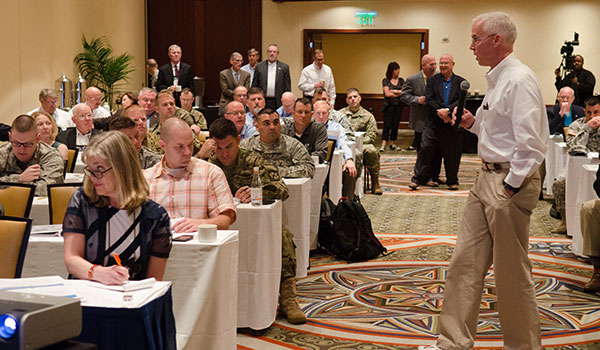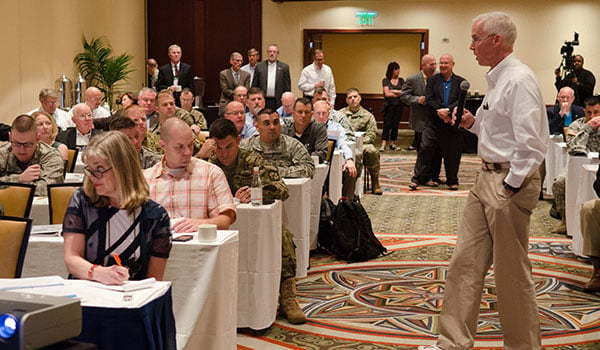
President’s Cockpit / By BG E.J. Sinclair, Ret.: Our 73 local chapters are the centerpiece of AAAA. The National Executive Group works hard to maintain a close relationship and support the local chapters.

AAAA Executive Director Bill Harris (standing with mic) answers a question at the Chapter Officer Workshop, Thursday, April 28, 2016, during the AAAA Army Aviation Mission Solutions Summit in Atlanta, GA. / AAPI PHOTO BY RENÉ BIDEZ
From the Mount Rainier Chapter to Rio Grande Chapter, to the Air Assault Chapter and their very successful House of Heroes effort, your National Executive Group has been very busy traveling around the country to chapter events to make sure we are doing everything we can to support you.
That said, one of the issues that has impacted some of our chapters is the misperception that uniformed leaders are prohibited from holding elected positions as AAAA chapter officers, and particularly that Active Duty O-6s should not serve on private organization boards.
AAAA Executive Director Bill Harris addressed this at the AAAA Annual Summit in Atlanta during the Chapter workshops, but I want to make sure that the word gets out to all our members. At the workshop, Bill presented the results of his April meetings in the Pentagon with Mr. Mark Vetter, Associate Deputy General Counsel; and Ms. Peggy Baines, Associate Deputy General Counsel (Ethics and Fiscal).
Mr. Vetter provided the documents referenced below at the April 5, 2016 meeting. The first was a memo and attachment dated November 30, 2012 from Jessica Wright, then Principal Deputy, Office of the Under Secretary of Defense. The second document was DoD 5500.07-R, “Official Participation in Non-Federal Entities.”
The bottom line is that uniformed O-6 and below are NOT per se prohibited from being elected in their “personal capacity” to an AAAA chapter leadership position unless they “…serve in a leadership position that spans an entire installation (e.g. base commander, base command sergeant major)…” [Nov 30, 2012 doc].
Even so, it is recommended that you do consult your local Ethics Counselor (EC) in your official capacity. They will use their technical chains for additional guidance. In our experience at AAAA, it is best if senior elected enlisted, warrant, or officer personnel can demonstrate an ongoing past relationship with AAAA in terms of membership longevity, leadership etc. This helps avoid any appearance that the AAAA chapter elected position is solely based on the person’s official military position.
Finally, the elected person must recuse themselves from any decision in their official capacity that could have the appearance of materially benefiting the private organization, in this case AAAA. Any such decision should be referred to the next higher headquarters/level of command.
The documents provided to us are now on the AAAA website at: http://www.quad-a.org/images/faq/chapters/Leadership_ppt/4_Memo_Change_Policy.pdf http://www.quad-a.org/images/faq/chapters/Leadership_ppt/5_Official_Participation_NFE.pdf
Your local Ethics Counselor will know how to contact Mr. Vetter and Ms. Baines for further information. They may also contact AAAA HQ for the contact information as well.
We see it as vital that AAAA remain in touch with our Soldiers through chapter leadership that closely reflects the membership of those chapters. AAAA is the umbrella organization for our entire Army Aviation Community, AC/RC, retired, industry, Department of Army Civilian, veterans and civilians who help us achieve our mission statement, “Supporting the U.S. Army Aviation Soldier and Family.” It is critical that those in uniform sit on AAAA boards and make sure their Soldiers’ issues are addressed firsthand.
Above the Best!
BG E.J. Sinclair, Ret.
32nd President, AAAA
This email address is being protected from spambots. You need JavaScript enabled to view it.






